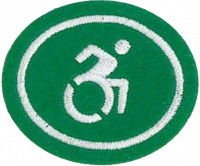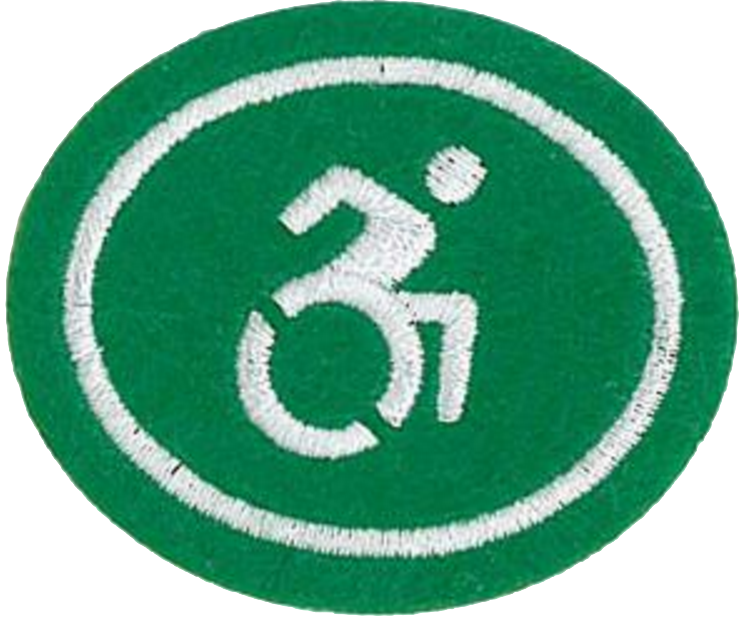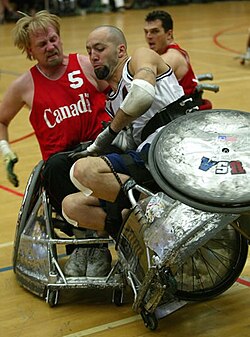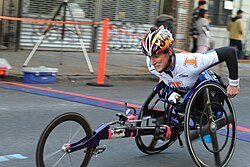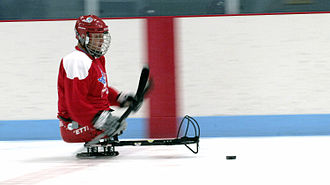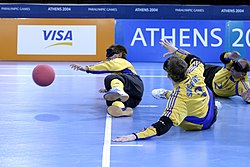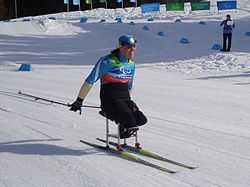AY Honor Adapted Sports Answer Key
1
Adapted sports are competitive sports for individuals with disabilities. While the adapted sports often parallel existing sports played by able-bodied athletes, there may be some modifications in the equipment and rules to meet the needs of the participants.[www.achievementcenters.org/adapted-sports.html Source]
Disabled sports also adaptive sports or parasports, are sports played by persons with a disability, including physical and intellectual disabilities. As many disabled sports are based on existing able bodied sports, modified to meet the needs of persons with a disability, they are sometimes referred to as adapted sports. However, not all disabled sports are adapted; several sports that have been specifically created for persons with a disability have no equivalent in able-bodied sports. Disability exists in four categories: physical, mental, permanent and temporary. (https://en.wikipedia.org/wiki/Disabled_sports Wikipedia)
Organized sport for persons with physical disabilities existed as early as 1911, when the "Cripples Olympiad" was held in the U.S.A. Significant development of adapted sports followed WWII as the USA, UK and other countries struggled to rehabilitate war wounded. Sport for rehabilitation grew into recreational sport and then into competitive sport. Disabled Sports USA (originally named the National Amputee Skiers Association) was established in 1967 by disabled military veterans to help rehabilitate the injured solders returning from Vietnam.
Sport for persons with intellectual disabilities began to be organized in the 1960s through the Special Olympics movement. This grew out of a series of summer camps organized by Eunice Kennedy Shriver, beginning in 1962. In 1968 the first international Special Olympics were held, in Chicago. Today, Special Olympics provides training and competition in a variety of sports for persons with intellectual disabilities.
Formal international competition in deaf sport began with the 1924 Paris Silent Games, organized by the Comité International des Sports des Sourds, CISS (The International Committee of Sports for the Deaf). These games eventually became the modern Deaflympics, governed by the CISS. The CISS maintains separate games for deaf athletes based on their numbers, their special communication needs on the sports field, and the social interaction that is a vital part of sports.
"Unified sports" involve teams made up of athletes with and without disabilities.[18] Since the 1990s, Special Olympics Unified Sports have been promoting social inclusion through shared sports training and competition. This initiative has expanded globally and now involves more than 700,000 players in 127 countries worldwide. The principle behind Unified Sports is simple: training together and playing together is a quick path to friendship and understanding.
2
Sports and physical activity benefits the disabled in the same ways it benefits the able bodied - better muscle tone, better respiration, increased energy, and overall increased health. Being active can fight depression and brighten modes. A sense of achievement can be gained from sports, both from winning and simply improving skills over time. Sports and recreation are an excellent way to make new friends and build closer bonds to other people.
Many disabled experience increased frustration because their lives include extra challenges, they face employment and other forms of discrimination, and they can feel like "losers" in general. Therefore being able to do sports like other people can, perhaps even better then those around them, can provide tremendous encouragement.
For rehabilitation, remember that many adaptive sports originated out of efforts to rehabilitate wounded solders. Essentially sports act as a form of physical therapy, getting injured people and amputees back into life and physically active again after what is often extended time in hospital.
3
Everyone should have the opportunities to learn sport skills and become active for life, whether they choose to pursue competition or strictly recreational sports. We can all benefit from increased physical activity and the opportunity for achievement. Persons with disabilities deserve to have access to quality sport and physical activity programs just like everyone else but they experience different opportunities and challenges when pursuing sport and physical activity.
The disabled make up a significant part of the world population, even in highly developed countries with excellent medical systems. For example, approximately 14% of Canadians have a sensory, intellectual or physical disability according to Stats Canada.
According to CS4L "almost all of the principles behind Canada’s model for able-bodied athletes are applicable to athletes with disabilities but athletes, coaches, parents, administrators, and health professionals need to consider additional factors in the delivery of sport and physical activity so that athletes with disabilities can follow a high-performance pathway or simply maintain an active, healthy lifestyle." Source
4
Organized sport for athletes with a disability is generally divided into three broad disability groups: the deaf, people with physical disabilities, and people with intellectual disabilities. Each group has a distinct history, organization, competition program, and approach to sport necessitated by the respective disabilities.
Types of Adaptive Sports Include:
Snowsports– Skiing, Snowboarding, Sledding
Adaptations include special mono-skis
Watersports– SCUBA diving, Free diving, Swimming
Water can allow a mobility disabled person much greater freedom to move. “I love Scuba diving because there is no rush, no competition, no limitations. On the surface I’m limited to my chair and every daily task takes awhile, but in the ocean I am free to move at my own pace, in any direction I want, without limitations.” – Dave Hosick, C7 quadriplegic Dive Master - [1]
Racing– Road Hand-cycling, Mountain Biking, Running, Triathlon
Adaptions are often an extension of the individual’s natural way of mobility, be it a wheelchair or prosthetic leg(s)
On the Water Sports– Surfing, Sailing, Kayaking, Rowing, Rafting
Outdoor Sports– Climbing, Camping, Fishing, Hunting, Shooting, Archery
Recreational Sports– Golf, Tennis, Equestrian, Curling
Wheelchair curling is an example.
Competitive Sports– Soccer, Rugby, wrestling, Basketball, Hockey, Football, Fencing
Wheelchair versions of all these sports are played. A blind football event was held in Cameroon in 2015. Ice sledge hockey in a Paralmpic sport.
Sourced partly from https://www.makeahero.org/
See all Paralympic Games sports listed here with links to details including videos: http://www.paralympic.org/sports
5
- The Deaflympics are hosted somewhere in the world on odd years, alternating between Summer and Winter games. [2]
- Deaf World Championships are occasionally hosted in various sports [3]
- Special Olympics World Games, which alternate between summer and winter games held every two years. The most recent World Summer Games were the Special Olympics World Summer Games, held in Los Angeles, California (The largest event in LA since the 1984 Olympic Games), from July 25, 2015 to August 2, 2015 and for the first time were covered by ESPN. Graz and Schladming, Austria will host the next Special Olympics World Winter Games from March 14–25, 2017.
- Paralympic Games which since the 1988 Summer Games in Seoul, have been held almost immediately following the respective Olympic Games.
6
Prepare your questions, be respectful and thank the person for their time. This Requirement might be conveniently met while doing Requirement 7.
7
7a
i
ii
iii
iv
7b
Field Trip time! We can't provide list of every possible place in the world to visit that works with disabled or adaptive sports, but here are some organizations that may be able to help. Look into their local and regional affiliates for an organization or event close to you.
- www.ipc-alpineskiing.org
- www.ipc-athletics.paralympic.org
- www.ipc-icesledgehockey.org
- www.ipc-nordicskiing.org
- www.ipc-powerlifting.org
- www.ipc-shooting.org
- www.ipc-swimming.org
- www.ipc-wheelchairdancesport.org
- http://www.paralympic.org/events (lists upcoming events worldwide)
- http://www.disabledsportsusa.org/ check events and local chapters
- http://canadiansportforlife.ca/athletes-disabilities
- https://www.makeahero.org/adaptive-sports/find-a-group/
- http://www.wasusa.org/
- http://www.iahd.org/
Search for "disabled sports" or "adaptive sports" and your city name for local examples.
8
8a
8b
8c
While not explicitly stated, like similar requirements in other honors we take these as three different options. Given the range of required information, a 500 word paper or 3-5 minute oral presentation will prove too short.
Some research starting points:
- https://en.wikipedia.org/wiki/Paralympic_Games
- https://en.wikipedia.org/wiki/International_Paralympic_Committee
- http://www.paralympic.org/
- Paralympic Hall of Fame inductees:
- 2006: Jouko Grip (Finland), Ulla Renvall (Sweden), Annemie Schneider (Germany)
- 2008: Connie Hansen (Denmark(, Claudia Hengst (Germany), Peter Homann (Australia), André Viger (Canada), Kevin McIntosh-coach (Australia)
- 2010: Tanja Kari (Finland), Chris Waddell (United States), Rolf Hettich-coach (Germany0
- 2012: Louise Sauvage (Australia), Trischa Zorn-Hudson (United States), Roberto Marson (Italy), Frank Ponta (Australia), Chris Holmes (Great Britain0
- 2014: Jon Kreamelmeyer (United States), Eric Villalon Fuentes (Spain), Verena Bentele (Germany)
9
Discuss different types of disabilities while you do this. Can a disabled person bring richness to the club? Might a blind person actually be better at some Arts and Crafts honors or knot tying? What accommodations would you need to make for a Pathfinder in a wheel chair? The type of accommodation will depend on both the sport or other activity and the Pathfinder's abilities.
The main author of these answers is part of a club with a mentally challenged Pathfinder. We accommodate him by assigning other Pathfinders and staff to monitor him and cut him slack in marching etc. We put someone else with him to do a speaking part in church so he felt included, while the boy did hand actions. We award Adventurer Awards where possible to him that match the honors we do as a club, so he has badges on his sash that reflect his ability to master material.
10
10a
10b
10c
10d
10e
10f
Old Testament
- ‘Then Abraham prayed to God, and God healed Abimelech, his wife and his slave girls so they could have children again, for the Lord had closed up every womb in Abimelech's household because of Abraham's wife Sarah.’ Gen 20:17-18 there are other examples of God opening wombs, such as Hanna, Sarah etc.
- God inflicted Miriam with leprosy and Moses interceded for her saying, ‘O God, please heal her!’ Though there is no record of her healing it must be assumed that the Lord exchanged this act of judgement with the lesser penalty of seven days of disgrace outside the camp. There is no further mention of her having leprosy. Num 12:1-15
- King Jeroboam pointed his hand in judgement at an unnamed prophet and it ‘shriveled up.’ The prophet interceded for Jeroboam and his hand was restored to health. (a short term disability) 1 Kings 13:4-6
- Naaman was healed of leprosy after following Elisha’s counsel. 2 Kings 5:1-14
- Nebuchadnezzar ‘looked to heaven’ and was healed of insanity. Daniel 4:34, 36
Gospels-Healed by Jesus
Jesus healed a number of people with what we would now term a disability, as well as some who we would classify as having a disabling disease. He also engaged in mass healings. Other miracles, including raising three people to life during his ministry and many people coming to life during the crucifixion, are excluded from the list as not applicable to this honor.
The disability healings recorded in the Bible are listed in roughly chronological order, with Bible text references, From the references you should be able to answer the questions required:
- Nobleman's son healed in Cana John 4:46-54.
- Leper healed in Capernaum Matt 8:2-4; Mark 1:40-45; Luke 5:12-15.
- Centurion's servant healed in Capernaum Matt 8:5-13; Luke 7:1-10.
- Demoniac healed in Capernaum Mark 1:21-28; Luke 4:31-37.
- Peter's mother-in-law healed in Capernaum Matt 8:14, 15; Mark 1:29-31; Luke 4:38, 39.
- Paralytic healed in Capernaum Matt 9:2-8; Mark 2:1-12; Luke 5:17-26.
- Impotent man healed in Jerusalem John 5:1-16.
- Man with withered hand healed in Galilee Matt 12:10-14; Mark 3:1-6; Luke 6:6-11.
- Blind and dumb demoniac healed in Galilee Matt 12:22-24; Luke 11:14.
- Demoniacs dispossessed in Gadara Matt 8:28-34; Mark 5:1-20.
- Mary Magdalene healed of evil spirits and infirmities Mark 16:9, Luke 8:2
- Woman with issue of blood healed near Capernaum Matt 9:18-26; Mark 5:22-24; Luke 8:41-56.
- Two blind men restored to sight in Capernaum Matt 9:27-31.
- Dumb demoniac healed in Capernaum Matt 9:32-34.
- Syrophœnician's daughter healed at coasts of Tyre and Sidon Matt 15:21-28; Mark 7:24-30.
- Deaf and dumb man healed in Decapolis Mark 7:31-37.
- Blind man restored to sight in Bethsaida Mark 8:22-26.
- Demoniac and lunatic boy healed near Cæsarea Philippi Matt 17:14-21; Mark 9:14-29; Luke 9:37-43.
- The eyes of one born blind opened in Jerusalem John 9:1-41.
- Woman, of eighteen years' infirmity, cured in Perea Luke 13:10-17.
- Dropsical man healed in Perea Luke 14:1-6.
- Ten lepers cleansed near the borders of Samaria Luke 17:11-19.
- Two blind beggars restored to sight at Jericho Matt 20:29-34; Mark 10:46-52; Luke 18:35-43.
Disciples/Apostles
Jesus gave the disciples power to heal and they did:
"He called His twelve disciples to Him and gave them authority to drive out evil spirits and to heal every disease and sickness" Matthew 10:1.
"As you go, preach this message: ‘The kingdom of heaven is near.’ Heal the sick, raise the dead, cleanse those who have leprosy, drive out demons" Matthew 10:7-8.
Even a man, who was not one of the disciples was driving out demons in Jesus name. The disciples told him to stop but Jesus said "do not stop him. No one who does a miracle in my name can in the next moment say anything bad about me for whoever is not against us is for us" Mark 9:38.
Peter and John healed a 40+ year old man born lame in Acts 3 and 4:22
And there were more mass healings "people brought the sick into the streets and laid them on beds and mats so that at least Peter’s shadow might fall on some of them as he passed by. Crowds gathered also from the towns around Jerusalem, bringing their sick and those tormented by impure spirits, and all of them were healed." Acts 5:12-16
Jesus and the apostles typically heal a physical malady and then share the Good News. While healing isn’t always accompanied by preaching, it is notable that it often is in these stories.
However, the disciples sometimes failed to heal - why?:
- Gentile Woman's Demoniac Daughter Matthew 15:21-28, Mark 7:24-30
- Epileptic Son Matthew 17:14-21, Mark 9:17-29, Luke 9:37-42
11
Worship the Lord your God, and his blessing will be on your food and water. I will take away sickness from among you, and none will miscarry or be barren in your land. I will give you a full life span. Ex 23:25-26
In that day the deaf will hear the words of the scroll, and out of gloom and darkness the eyes of the blind will see. Isa 29:18
But he was pierced for our transgressions, he was crushed for our iniquities; the punishment that brought us peace was upon him, and by his wounds we are healed. Isa 53:5
Fruit trees of all kinds will grow on both banks of the river. Their leaves will not wither, nor will their fruit fail. Every month they will bear, because the water from the sanctuary flows to them. Their fruit will serve for food and their leaves for healing. Ezek 47:12
As he went along, he saw a man blind from birth. His disciples asked him, "Rabbi, who sinned, this man or his parents, that he was born blind?" "Neither this man nor his parents sinned," said Jesus, "but this happened so that the work of God might be displayed in his life. As long as it is day, we must do the work of him who sent me. Night is coming, when no-one can work. While I am in the world, I am the light of the world." John 9:1-5
References
- https://en.wikipedia.org/wiki/Disabled_Sports_USA
- https://en.wikipedia.org/wiki/Disabled_sports
- http://www.deaflympics.com//
- http://www.voiceofhealing.info/02history/oldtestament.html
- https://en.wikipedia.org/wiki/Paralympic_Games
- https://en.wikipedia.org/wiki/International_Paralympic_Committee
- http://www.paralympic.org/
- https://achievementcenters.org/adapted-sports.html
